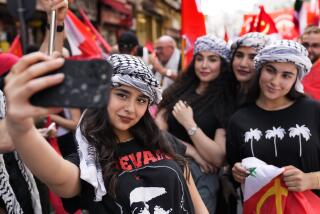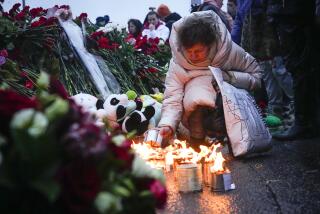Yeltsin Denounced in Moscow Victory Parade : Russia: World War II veterans, other unhappy citizens mark triumph. The protest is peaceful.
- Share via
MOSCOW — Denouncing President Boris N. Yeltsin as a fascist like Adolf Hitler, graying World War II veterans and other disillusioned Russians marched by the thousands Sunday in the biggest show of anti-Yeltsin fury here since the breakup of the Soviet Union.
“We will win because Russia is with us!” National Salvation Front leader and reactionary member of Parliament Ilya V. Konstantinov predicted to a cheering crowd.
Thousands of riot police with bludgeons stood at the ready along with fire engines with high-pressure hoses, but the Victory Day holiday, commemorating the 48th anniversary of Nazi Germany’s defeat, brought no repeat of May Day violence in which a policeman was killed and more than 500 people were hurt.
The only explosions in Moscow were colored skyrockets and artillery salvos fired at 10 p.m. to mark the anniversary of the end of war in which more than 26 million Soviet men and women died.
For many of the older participants in the march to the Kremlin Wall and Red Square, Sunday was a bittersweet day, because the country they fought for no longer exists.
“Many of my comrades fell on the field of battle,” said one lanky Siberian-born veteran, economist Ivan N. Naumov, 68, a former sergeant in the infantry. “And then both (former Soviet President Mikhail S.) Gorbachev and Yeltsin broke apart the Soviet Union we had saved. This was a tragedy--not just for us but for the whole world.”
A march organizer, Lt. Col. Stanislav N. Terekhov of the anti-Yeltsin Officers Union, estimated the turnout at an overblown 300,000 to 400,000. Moscow authorities said the number did not top 25,000.
But from Russian television to Communist lawmaker Viktor G. Astafiev, there was agreement that it was the biggest protest against the free-market, pro-Western policies of Yeltsin since he became the top figure in the Kremlin.
“Today we are the force that we may consider to be the main force in our country!” a joyful Terekhov told the marchers as they rallied by the statue of poet Vladimir Mayakovsky to hear a succession of anti-reform orations.
Uncowed, Yeltsin laid a wreath on the Soviet Tomb of the Unknown Soldier at the Kremlin wall and stoutly defended his policies.
“The slump is over,” he told reporters. “Russia is beginning to raise itself up, little by little.”
Yeltsin, who Saturday cited April’s referendum as proof that his presidency is the sole institution trusted by voters, vowed that right after the holiday, new “documents on reform, on political and organizational matters will be signed” to capitalize on his showing at the polls.
Parliament Chairman Ruslan I. Khasbulatov, speaking to journalists after laying his own wreath, countered that Yeltsin’s draft for a new constitution is a “toy” that should be ignored.
Later, Yeltsin’s bodyguards prevented Khasbulatov and another frequent critic of the president, Constitutional Court Chairman Valery D. Zorkin, from joining Yeltsin for the dedication of a World War II memorial in western Moscow.
Yeltsin’s opponents assembled on a warm spring morning outside Byelorussia station, a railway depot where millions of Red Army men and women returned home to a delirious welcome after Berlin fell in 1945.
Elderly men and women, their lapels sagging with medals, were flanked by middle-aged and young opponents of Yeltsin’s policies. Marchers carried red Soviet flags, the yellow-black-white banners of the National Salvation Front and signs reading “We Defeated Hitlerism, We Will Defeat Yeltsinism” and “Save Russia From Capitalist Slavery and Yeltsin’s Mafia.”
From somewhere, the conservatives obtained a diesel-powered tactical-missile carrier, minus the missile, to replace their sound truck, which was burned to a hulk in the May Day melee. Adorned with portraits oI. Lenin and Josef Stalin, the huge olive-drab vehicle, belching exhaust, lurched down Tverskaya Street to become the platform from which Konstantinov, Terekhov and other anti-Yeltsin dignitaries harangued the crowd.
Despite the speakers’ combative rhetoric, moderation was actually shown by both sides. Authorities had banned protest signs and loudspeakers on Red Square, but to avoid confrontations, they let demonstrators tote them onto the square anyway.
Trucks carrying riot police waited discreetly out of sight in courtyards and behind the GUM department store, rather than blocking the marchers’s path as they had done a week before.
In the biggest departure from May Day, when scores of toughs armed with iron rods, hunks of concrete and other weapons waded into police and started slugging it out, Sunday’s crowd was well-behaved.
Scuffles did break out when pro-Yeltsin demonstrators began chanting during the right-wingers’ rally. Moscow City Council member Vyacheslav K. Titov brought a Russian tricolor--the flag carried by Yeltsin supporters--to show protesters that real democrats are on their side. But he had to fold up the flag and stash it in a bag after nearly getting beaten up.
For many marchers, the disappearance of one of their recent heroes, Working Moscow leader Viktor Anpilov, cast a shadow on the day. A ringleader of the May Day rally that turned into a melee, Anpilov was interrogated Saturday by investigators, who claim he was then released. But he never returned home. Anti-Yeltsin forces said they will regroup today outside the Lenin Museum to get the latest news.
Victory Day celebrations were held throughout the former Soviet Union. In St. Petersburg, demonstrators marched down Nevsky Prospekt demanding that Yeltsin’s government be put on trial.
In two locations, the day was marred by tragedies of an unpolitical sort. In Nizhny Tagil in the Urals, a Yakovlev 52 airplane crashed on a city square during a stunt flight. Fifteen people, including the pilot, were killed, preliminary reports said.
In the Volga city of Saransk, a helicopter scattering leaflets of holiday greetings clipped trolley cables and crashed in front of the local Parliament, killing two crew members and injuring three others.
Sergei L. Loiko, a reporter in The Times’ Moscow Bureau, contributed to this article.
More to Read
Sign up for Essential California
The most important California stories and recommendations in your inbox every morning.
You may occasionally receive promotional content from the Los Angeles Times.










